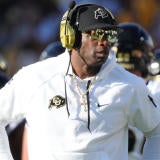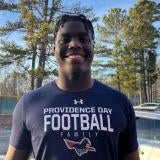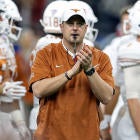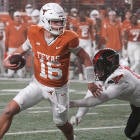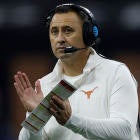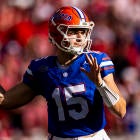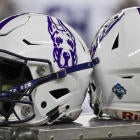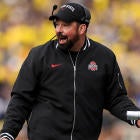The 2018 season is in the books, and the Clemson Tigers stood on top of the hill after becoming the first 15-0 team in modern college football history and topping Alabama 44-16 in the College Football Playoff National Championship. That victory lap served as the closing act of a season that was filled with twists, turns and lessons that have been learned.
What are the primary takeaways from 2018 that we should keep in mind as we head into the doldrums of the offseason? Let's recap them:
1. There is no dynasty, and that's OK: "The Alabama dynasty is dead" became a popular headline after the Crimson Tide's blowout loss. That is a bit premature. The actual truth is that, at least for now, there is no dynasty in college football. Alabama and Clemson are equals, and head and shoulders above everybody else in the sport. To be a dynasty, a team (or family) has to rule the sport (or nation).
Clemson has won two of the last three national championships, Dabo Swinney has topped Nick Saban two of the last three meetings and the Tigers are currently on top of the college football world. That resume suggests, if anything, that Clemson is the real dynasty in the sport. But since the two powers seem to be trading control on an annual basis, let's call it what it is -- Alabama and Clemson are 900-pound gorillas that destroy everything in their paths ... until they meet each other. At that point, it's anybody's guess.
2. Texas is back ... sort of: The Longhorns finished the season with the bang, earning a berth in the Sugar Bowl and topping SEC East champion Georgia 28-21 in a game that wasn't as close as the score indicated. A No. 9 ranking in both major polls, quarterback Sam Ehlinger returning and a defense that is phenomenal by Big 12 standards, it's safe to say that Texas is truly "back" heading into Tom Herman's third season at the helm. Let's temper that just a little bit. Texas suddenly becoming the class of the Big 12 is a bit aggressive considering that Lincoln Riley and his center for quarterback superstardom still exists at Oklahoma.
But will we see Red River Rivalry repeats in the Big 12 Championship Games on a regular basis? Absolutely. Considering how woeful Oklahoma's defense has been, I'd go so far as to say that Texas is more likely to become the super power that can consistently compete with Alabama and Clemson on a national level than Oklahoma because of its balance and success on both sides of the ball. After all, you can't be elite if you aren't complete.
3. Georgia has staying power: The 2018 season ended on a sour note for the Bulldogs. They blew a lead to Alabama in the SEC Championship Game and then the Longhorns annihilated them in the Superdome. But that doesn't change the fact that the season proved that coach Kirby Smart and the Bulldogs are here to stay on the national scene, and should be considered a threat to win the national title. Smart's ability to replace stars in the front seven, the running back duo of Sony Michel and Nick Chubb and develop an offensive line that was one of the best in the game shows that he's well on his way to becoming one of the best coaches in the game. That, combined with the recruiting prowess, confirms to me that Georgia will win a national title within the next five years.
4. Call dark horses for what they are in 2019: Let's take a look back at the preseason AP Top 25, shall we? No. 4 Wisconsin had a first place vote, Washington was ranked No. 6, Miami chimed in at the No. 8 spot and Auburn was sitting pretty at No. 9. OK, I get it. At the time, a case could be made for all of those teams to be relevant on the national scale. But as we enter "talkin' season," let's refer to the 2019 version of those teams as what they truly are -- dark horses. Anything beyond that is too much.
The only teams to make the CFP over the last three seasons are Clemson, Alabama, Oklahoma, Ohio State, Georgia, Notre Dame and Washington. The Huskies are the only dark horse to make the four-team field, and they got smoked by the Crimson Tide in the 2016 Peach Bowl. In modern college football, dark horses are those teams ranked No. 20 or worse in the preseason polls.

5. Michigan is entering a critical year under Jim Harbaugh: There's only one way to describe Harbaugh's four years in Ann Arbor, Michigan ... "all sizzle and no steak." The Wolverines have been in the College Football Playoff mix late in the season twice and irrelevant in late November on the national scale twice. When you consider that he makes $7.5 million per year, it's clear that Michigan is getting ripped off.
Harbaugh has built a program similar to what Les Miles had during his final four seasons at LSU. They win old school-style football games that are controlled by the Michigan defense, which allows the offense to operate the way Harbaugh wants. When the defense fails -- and it happens a few times ever year -- the Wolverines simply aren't prepared to win outside of the comfort zone created by the coaching staff. Unless that changes, Harbaugh won't win a national championship.
6. The Pac-12 is in dire straits: "West coast, best coast" is the college football version of a unicorn ... it doesn't exist. The Pac-12 missed out on the CFP for the second straight season and was largely irrelevant for the entire month of November. It gets the worst time slots of the Power Five, doesn't have a program that every other team is gunning for and is a combined 4-12 over the last two bowl seasons. What's even more concerning is that there doesn't appear to be light at the end of the tunnel.
USC is a mess and nearly fired coach Clay Helton, UCLA doesn't appear to be anywhere close to contending with Chip Kelly, Washington is replacing a ton of talent and lost to a mid- to lower-tier SEC team in 2018 even with that talent, Oregon isn't there yet and Utah is stuck in "good, but not great" territory." Where's the hope? There isn't any.
7. This is the golden age of quarterbacks: There's no other way to slice it ... this is the greatest quarterback age in college football history. Alabama's Tua Tagovailoa and Heisman Trophy winner Kyler Murray at Oklahoma both eclipsed the single-season passing efficiency record in 2018, which was set one year earlier by former Sooners signal caller Baker Mayfield. Four other quarterbacks completed 70 percent or more of their passes for the first time since 2011, three quarterbacks averaged 10 yards or more per attempt for the second straight year and five of the top 10 passers in the country were in their first full year starting at their respective schools. Whether it's Lincoln Riley at Oklahoma, Mike Leach at Washington State, Ryan Day at Ohio State or the new offensive philosophy at Alabama, it's clear that quarterbacks and quarterback coaching comes in all shapes and sizes in the college game, and fans are better off because of it.







